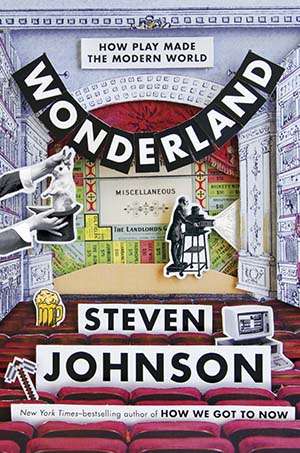When Play Drives Progress
Beach volleyball, bone flutes, Doritos, and the search for novelty

Wonderland: How Play Made the Modern World, by Steven Johnson, Riverhead Books, 322 pages, $30

At the 1996 Republican convention, Newt Gingrich gave what the editors of The Weekly Standard condemned as "the worst and most embarrassing speech of his career." Pulling Olympic gold medalist Kent Steffes up on stage, the speaker of the House and leader of the Republican Revolution sang the praises of the unplanned creativity that had produced…beach volleyball. "There's a whole new world of opportunity opening up that didn't exist 30 or 50 years ago—and no bureaucrat would have invented it," he said. "That's what freedom is all about."
Yikes. Newt obviously didn't get the memo.
Conservatives weren't supposed to celebrate beach volleyball. They were supposed to be serious, to praise hard work, self-restraint, and small-town virtues—"God, family, honor, duty, country," as nominee Bob Dole said in his convention speech. Not fun in the sun. Or anything else spontaneous and creative, especially if it came out of California. "Locating the spirit of American freedom in Olympic beach volleyball," the Standard said, was completely off-message. (Never mind that the convention crowd cheered.)
I highlighted this strange political moment in my book The Future and Its Enemies, published two years later, because it captured an important clash of worldviews. On one side were those who celebrated entrepreneurship, spontaneity, innovation, and the market's ability to produce new pleasures. On the other were those who believed that prosperity flowed from diligence, thrift, and self-denial, and worried that too much fun threatened to destroy culture, markets, government, and all things good and true. The latter view, particularly dear to neoconservatives, I dubbed the "repression theory of progress." Best articulated in Daniel Bell's The Cultural Contradictions of Capitalism, which built on Max Weber's idea of the Protestant ethic, the repression theory predicted that consumer culture's emphasis on "play, fun, display, and pleasure" would ultimately undermine the whole system. Capitalism contained the seeds of its own destruction.
Steven Johnson does not buy the repression theory of progress. Nor does he accept its counterpart on the left, where technology and markets equal oppression and drudgery. A man of the center-left, he is a classic dynamist: a genuine liberal who appreciates the power of inventions and institutions that emerge from the bottom up. In Wonderland, Johnson, whose previous works include How We Got to Now (the basis for a PBS series) and Where Good Ideas Come From, explores the playful sources of innovation.
"When human beings create and share experiences designed to delight or amaze," he writes, "they often end up transforming society in more dramatic ways than people focused on more utilitarian concerns. We owe a great deal of the modern world to people doggedly trying to solve a high-minded problem: how to construct an internal combustion engine or manufacture vaccines in large quantities. But a surprising amount of modernity has its roots in another kind of activity: people mucking around with magic, toys, games, and other seemingly idle pastimes."
Johnson is not a theorist. He never attempts to define play or to clarify why he highlights some experiences designed to delight or amaze rather than others. (Why so little on sports in a chapter on games? Why so down on the automobile? Why spices rather than, say, dyes and pigments? In a resolutely global and multicultural work, why so little on China?) He doesn't separate playful forms of consumption from playful forms of production, nor does he try to explain why some types of play lead to bigger things while others are simply ephemeral fun. He mines the scholarly literature efficiently but superficially, telling enjoyable stories without worrying about debates over, say, exactly when and how Indian cotton prints spread through the West. Wonderland isn't building new intellectual infrastructure or trying to explain why the Great Enrichment started in Europe rather than Asia. But Johnson's stories do effectively blow away what's left of the repression theory of progress.
The book is, in fact, an example of what it's about: an experience designed to delight and amaze—to give readers a new appreciation of the wonders around us. Johnson is a charming tour guide, full of tales that imbue a familiar landscape with new meaning.
In his chapter on spices, for example, he pronounces Doritos "true citizens of the world." Corn, he explains, "was originally domesticated as maize in Mexico; soybeans first took root as an ancient East Asian crop; sunflowers were mostly native to North America; cheddar cheese was first crafted in England, while Romano comes from Italy. The milk in buttermilk and other cheeses dates back to the first cows that were domesticated for milk in Southwest Asia ten thousand years ago. No one knows for sure where onions first originated, but they are likely as old as agriculture itself. While we think of tomatoes as staples of the cuisines of Spain and Italy, the tomato plant first grew in the Andes of South America. Sugarcane hails from Southeast Asia, garlic came from Central Asia, and red and green pepper were native to Central and South America. An entire planet's worth of flavors converge every time you savor the tangy, sharp taste of that Doritos chip." The quest for new and pleasurable tastes, he argues, drove exploration and trade, drawing the world together.
The same chapter tells the tale of the "Pepper Wreck," a Portuguese ship that went down in 1606 as it neared Lisbon. In 1996, undersea archaeologists recovered much of its precious cargo: gold, silver, porcelain, and stoneware, all under a "dark blanket of peppercorns" worth many times their weight in gold. The pepper mill on your kitchen counter, grinding out piquancy for pennies, illustrates material progress every bit as much as your smartphone.
Johnson locates the deep origins of that phone in delight as well. He introduces Charles Babbage, the 19th century inventor whose calculating machines were the ancestors of modern computers, not as an adult genius but as a "precocious eight-year-old" wondering at a tiny mechanical dancer. "This lady attitudinized in a most fascinating manner," Babbage later recalled. "Her eyes were full of imagination, and irresistible." It was that "moment of seduction," Johnson writes, that sparked Babbage's world-changing "passion for mechanical thinking."
Exploring the byways of material culture, Johnson raises some intriguing questions. His strong chapter on music starts with the bones of a cave bear, a griffon vulture, a swan, and two mammoths—all of which primordial human beings carved into flutes. What a strangely impractical thing to do! "Put yourself in that Slovenian cave forty thousand years ago," he writes: "you've mastered fire, built simple tools for hunting, learned how to craft garments from animal skins to keep yourself warm in the winter. An entire universe of further innovation lies in front of you. What would you choose to invent next? It seems preposterous that you would turn to crafting a tool that created vibrations in air molecules that synchronized at a perfect 3:2 ratio when played together. Yet that is exactly what our ancestors did."
Surveying the literature for explanations, Johnson takes issue with those who treat our desire for music as a survival-driven appetite like the quest for food or sex. Music, Johnson argues, isn't merely something that "presses our pleasure buttons," in Steven Pinker's words, at least not in a straightforward way. Rather, he writes, "music—like the patterns and colors unleashed by the fashion revolution—appears to resonate with our pleasure centers at more of an oblique angle." Music, he declares, derives from the pleasure of novelty. "Music," he writes, "seems to send us out on a quest for new experiences: more of the same, but different."
Johnson is right that evolutionary psychology's pursuit of universal rules tends to underplay the (universal) drive for novelty, missing the sources of fads and fashion in favor of laying down aesthetic absolutes. But explaining why humans invented music solely by the quest for novelty doesn't quite work, because novelty is neither intrinsic to nor unique to the human love of music. After all, people often like to hear the same songs again and again and, to take one of those survival-driven, less "oblique" pleasures, they vary their diets when they have the opportunity. (We won't talk about sex.) Music and more primal appetites aren't necessarily so different.
So Johnson's answer is ultimately unsatisfying: Early humans made flutes because they wanted to hear something new. But simply raising the question—and introducing us to so many bone flutes from so many times and places—itself strikes wonder and delight.
That repeated effect makes Wonderland both a pleasure to read and, in its entertaining way, a serious cultural contribution. In a media market where gloom and fear are perennial best-sellers, Johnson instead reminds us how much happenstance and joy went into creating the wondrous modern world.
This article originally appeared in print under the headline "When Play Drives Progress."


Show Comments (9)